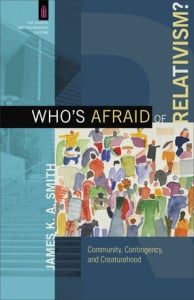North American Christianity has a problem. Actually, it has the problem — the sin of Adam that led to his dismal fall. He has heard the temptation “ye shall be like gods” and ate of its fruit in modern form. According to James Smith in his latest work Who’s Afraid of Relativism? the pursuit of objective and absolute truth amounts to a denial of the creaturehood and contingency acknowledged by any who submit to a biblical account of philosophy.
Professor Smith thinks this distinctly modern error characterizes most of contemporary christian apologetics and philosophy. We are so preoccupied with finding objective reasons independent from our communities and social practices that we forget that God created us to function as contingent and finite creatures. As a result, anyone who gives countenance to relativism will be subject to “philosophical McCarthyism” of old school “Is ‘there are no objective truths’ an objective truth?”-style apologetics. How has Christian philosophy come such a long way from its biblical origins? More specifically, why does the desire for absolute truth signify a hubristic denial of creaturehood (the most serious offence one can be accused of in the Judeo-Christian tradition, by the way)? Smith is more concerned with the second question, leaving the first relatively unexplored. His argument uses three major philosophers to support his main ideas. Ludwig Wittgenstein, Richard Rorty, and Robert Brandom each deny absolutist views and offer their own formulations of a way of life without objectivity.
The book is the final installment in Baker Academic’s series titled “The Church and Postmodern Culture.” As a piece of writing, it can be difficult to understand at times. The tantalizing “use” of “unnecessary” quotations and italics often confuse the “meaning” (i.e. clarity) of his argument, and the semi-continental abundance of countered name dropping critically resurrects a quasi-Žižekian penumbra matched only by David Bentley Hart. I tease. It’s not that bad. Even still, many readers will find this frustrating. In what follows, I will try to briefly summarize Smith’s main points.
Underlying absolutist views is an epistemology called “referentialism” (the unforgivable philosophy, according to Smith), which says that language and truth are claims about real things in the world and meaning is the correlation between a word and its corresponding thing. Wittgenstein explains the referentialist account with a metaphor.
I send someone shopping. I give him a slip marked “five red apples.” He takes the slip to the shopkeeper, who opens the drawer marked “apples”; then he looks up the word “red” in a table and finds a colour sample opposite it; then he says the series of cardinal numbers — I assume that he knows them by heart — up to the word “five” and for each number he takes an apple of the same colour as the sample out of the drawer. (Philosophical Investigations, 1)
But this theory does not adequately represent how humans use language. Smith explains
There’s a little chink in the armor of the representationalist account here: it is the challenge of number. Is “five” a thing? Just what “thing” is referred to by the word “five?”… So Wittgenstein now has us wondering: Does language always work by referring?” (42)
It turns out on Wittgenstein’s account that language does not operate by reference, but by use.
Login to read more
Sign in or create a free account to access Subscriber-only content.
